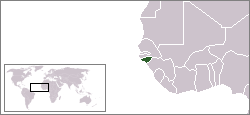LGBT rights in Guinea-Bissau
| LGBT rights in Guinea-Bissau | |
|---|---|
 | |
| Same-sex sexual activity legal? | Legal since 1993 |
| Family rights | |
| Adoption | Unknown |
Lesbian, gay, bisexual, and transgender (LGBT) persons in Guinea-Bissau face legal challenges not experienced by non-LGBT residents. Same-sex sexual activity is legal in Guinea-Bissau, but same-sex couples and households headed by same-sex couples are not eligible for the same legal protections available to opposite-sex couples.
Law regarding same-sex sexual activity
Both male and female same-sex sexual acts are legal since 1993 in Guinea-Bissau.[1]
In December 2008, Guinea-Bissau became one of 66 nations to sign the "United Nations Statement on Human Rights, Sexual Orientation and Gender Identity", which supports decriminalization of homosexuality and transgender identity.[2]
Recognition of same-sex relationships
The U.S. Department of State's 2011 Human Rights Report found that, "the law (in 2011) only recognized heterosexual married couples as entitled to larger government housing."[3]
Adoption of children
According to a website of the French government, single and married people are eligible to adopt children. The website does not say whether LGBT people are disqualified.[4]
Living conditions
Of 19 African countries surveyed in 2010, Guinea-Bissau was one of the most tolerant about homosexual behavior. Nine percent in Guinea-Bissau said that homosexual behavior was morally acceptable, with fifteen percent saying it was not an issue.[5]
The U.S. Department of State's 2012 human rights report found that,
There are no laws that criminalize sexual orientation. Antidiscrimination laws do not apply to lesbian, gay, bisexual, and transgender individuals. There were no reported violent incidents or other human rights abuses targeting individuals based on their sexual orientation or identity. There was no official discrimination based on sexual orientation or gender identity in employment or access to education and health care. However, according to government guidelines for civil servants' housing allowances, only heterosexual married couples were entitled to family-size housing, while same-sex couples received the single person allotment. Social taboos against homosexuality sometimes restricted freedom to express sexual orientation, yet society was relatively tolerant of consensual same-sex conduct, according to a 2010 study by the Pew Research Center.[6]
Summary table
| Same-sex sexual activity legal | |
| Equal age of consent | |
| Anti-discrimination laws in hate speech and violence | |
| Anti-discrimination laws in employment | |
| Anti-discrimination laws in the provision of goods and services | |
| Same-sex marriage | |
| Recognition of same-sex couples | |
| Step-child adoption by same-sex couples | |
| Joint adoption by same-sex couples | |
| Gays and lesbians allowed to serve openly in the military | |
| Right to change legal gender | |
| Access to IVF for lesbians | |
| Commercial surrogacy for gay male couples | |
| MSMs allowed to donate blood | |
See also
References
- ↑ "State-sponsored Homophobia: A world survey of laws prohibiting same sex activity between consenting adults", The International Lesbian, Gay, Bisexual, Trans and Intersex Association, authored by Lucas Paoli Itaborahy and Jingshu Zhu, May 2013, page 20
- ↑ "Tin's 'Pride' at UN Statement on Decriminalisation of Homosexuality", UKGayNews, 18 December 2008
- ↑ 2011 Country Reports on Human Rights Practices: Guinea-Bissau, Bureau of Democracy, Human Rights and Labor, U.S. Department of State, page 16
- ↑ "Fiches pays Adoption: Equateur", France Diplomatie, French Ministry of Foreign Affairs, Google translation
- ↑ "Islam and Christianity in Sub-Saharan Africa", Topline Survey Results, Pew Forum on Religion and Public Life, Pew Research Center, question 85, page 276, 2010
- ↑ 2012 Country Reports on Human Rights Practices: Guinea-Bissau, Bureau of Democracy, Human Rights and Labor, U.S. Department of State, pages 17- 18